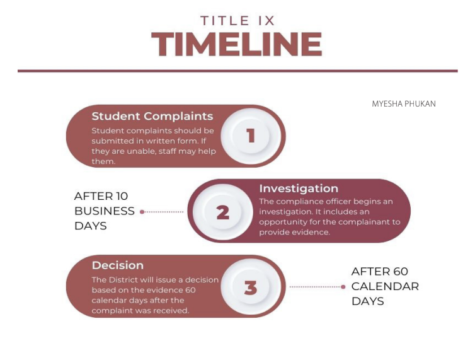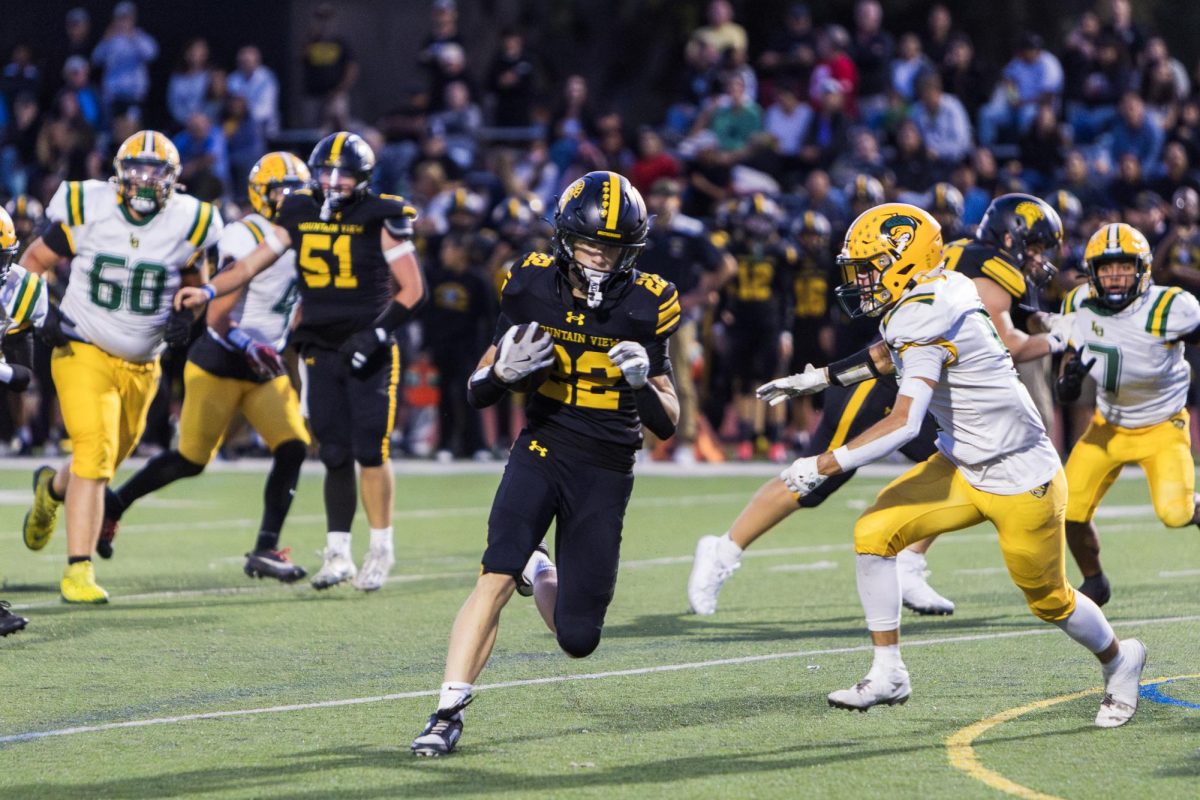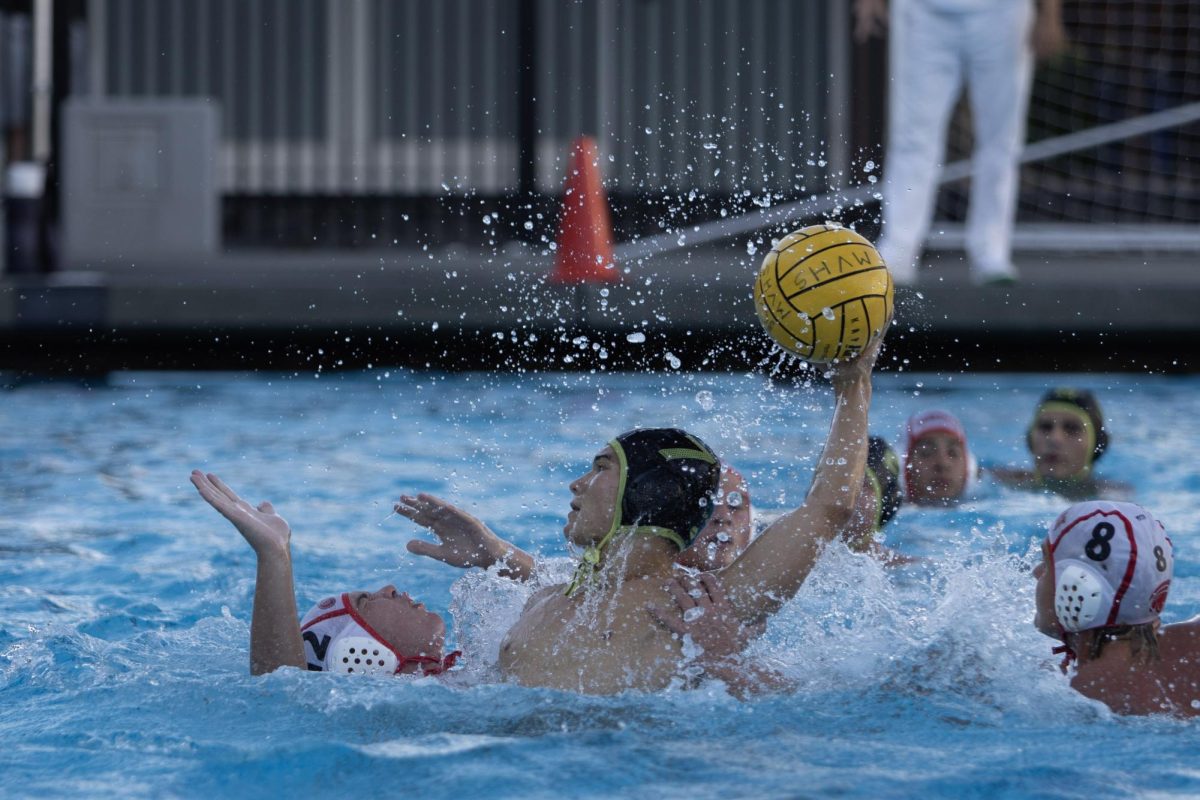“I just felt like nobody cared”: Students open up about their experiences with sexual harassment
May 8, 2023
This article was originally published in a print edition in April 2023.
Student Experiences:
Every night, a male student in junior Perry Mirshafiei’s elective class would allegedly text her, making sexual comments about her and asking her to have sex with him.
“My friend told me he’d been doing that to many other girls, and I just started crying,” Mirshafiei said.
It was after that moment that Mirshafiei realized that it was time to break her silence against Tyler* who was 17 at the time.
She reported her harassment to her teacher, who reported these allegations to the administration.
Sexual harassment, defined as any unwelcome conduct of a sexual nature, has become an increasingly recognized issue within society.
According to the American Association of University Women, 58% of seventh to 12th grade students experience sexual harassment, and according to the Journal of Adolescent Health, only 50% of high school victims report their cases.
The #MeToo movement, a movement against sexual harassment and assault, became more known to the public eye in 2017, after news reports of sexual abuse by Harvey Weinstein, an American film producer.
Principal Dr. Kip Glazer said that during this school year, MVHS administration received two harassment complaints that were thoroughly investigated, neither of which met the threshold to be considered a Title IX case, she said.
Title IX is a federal civil law in the United States that prohibits sex-based discrimination in any school or education program funded by the federal government.

According to the United States Department of Education, sexual harassment and violence such as rape, sexual assault, sexual battery, and sexual coercion are prohibited under Title IX.
Tyler also allegedly harassed other students, ranging from physical sexual harassment to sending unsolicited, explicit messages.
The alleged harassment not only occurred over social media platforms such as Instagram, but also in daily classes, and on school field trips.
Junior Caroline* said that over text message, Tyler asked her if she had masturbated before and talked about his own experiences with using pictures of other girls to masturbate.
At this time, Caroline was a freshman; Tyler was a junior who held a leadership position in the club that they were both in.
“He would be decently agitated if I wasn’t responding,” Caroline said. “It kind of made me feel guilty. [He] was using the power dynamic.”
Sending explicit photos, messages, and videos via Instagram and Snapchat has become a form of harassment that has arisen with the prevalence of social media.
Junior Aidan Evans said he was in a “situationship” with Mason* a current junior, in which he was sexually harassed on multiple occasions.
A “situationship” is defined as a romantic relationship that is undefined, according to NBC News.
On one such occasion, Evans and his friend Noelle*, also a junior, were on Facetime with Mason, when Evans said Mason screen shared a fully nude video of him masturbating.
According to Evans, the two did not report the incident to administration out of concern about outing — disclosing an LGBTQ+ person’s sexuality or gender against their wishes — the student to his parents.
“[The student] would talk about how their parents would kick them out if they found out they were gay,” Evans said. “That makes it extra scary because you don’t want to hurt that person.”
In hindsight, Evans said Mason’s claims were likely a “manipulation tactic.”
“People perceive it to be mostly straight men but there’s this not really known, kind of weird culture of gay guys where as long as the other guy’s gay then it means [harassment’s] okay,” Evans said.
He said on another occasion, he and Noelle were hanging out in a hot tub when a different male sent an unsolicited nude photo.
“We were laughing and sending funny stuff and then that happened,” Evans said.
Noelle said that in another case, multiple alleged victims came forward with their stories of sexual harassment by a student in their shared extracurricular club.
Junior Jack* allegedly also sent sexually explicit messages to Sylvia Kutach, a sophomore at Monta Vista High School, through Snapchat, where most of their conversations took place.
According to screenshots obtained by the Oracle, Jack saved Kutach’s picture in the chat and said “Also nice snap but there’s a problem, that should be my hand, not yours,” referring to Kutach placing a hand over her chest.
He allegedly sent other explicit messages through the same platform.
Kutach said that on one occasion, she sent Jack a message saying “What’s up?” to which he responded with an unsolicited, sexually explicit response, referring to female genitalia.
After Jack allegedly continued to send unsolicited sexually explicit messages, Kutach blocked him on Snapchat.
However, Jack later reached out to her through Instagram direct messages, where he allegedly continued to send more explicit messages.
“I kind of felt empty,” Kutach said. “Like something [was] pulling at me in my stomach.”
Jack also claimed Lucy Komo, a junior at Saint Francis, was his girlfriend.
She denied ever having been in a relationship with Jack. The two knew each other from middle school, but Komo said she hasn’t seen him since.
“He DM’d me in September with a pickup line, and I turned him down,” Komo said. “And he was repeatedly DMing me and snapping me, but I was just being polite [by responding].”
Komo said she blocked Jack on Snapchat after receiving a “sexual picture,” but he allegedly continued to message her on Instagram, asking if she wanted to “hang out.”
She said that Jack called her about 30 times in the span of two days, and found out from her friend Lilly* that he had spread sexually explicit rumors about her.
Stalking — a pattern of behavior directed at a specific person that would cause a reasonable person to feel fear — can take the form of repeated, unwanted communication through text or call, laying in wait in places such as a home, and spreading rumors about someone on the Internet or through word of mouth, according to Yale University’s Sexual Harassment and Assault Response & Education Program.
Komo said that she heard from Lilly that Jack had shown up at her old house, which she had only moved out of a year ago.
“I realized that he’s actually trying to find me,” Komo said. “So then it became a bigger issue of not so much rumors, but ‘Could he technically be harmful?’”
In order to document her experiences with Jack, Komo wrote a timeline of events.
When she told her parents about the incident, she said they became concerned for her safety around town, according to the timeline.
Komo said that in January, Jack had somehow found her school email address, and emailed her an apology, which she found unsettling.
“The constant harassment towards me has not only been scary but exhausting,” Komo said in the timeline. “I hope that he can seek the help he needs for his own benefit, but also for me to be able to live carefree and not have to deal with constant rumors and fears that he will show up at my house.”
The Aftermath of Experiencing Sexual Harassment:
Experiencing sexual harassment can have detrimental impacts on victims, including psychological, social, and academic consequences.
“Victims can be impacted in a multitude of ways, depending on the nature and the extent of the harassment,” said therapist, speaker, and entrepreneur Cecilia Ahrens. She said that previous traumas or experiences can also exacerbate the impacts of harassment.
According to the AAUW, “sexual harassment and violence in schools create hostile environments and can negatively impact students’ learning, mental health, and wellbeing.”
Grace Catan is the creator of the Tell Someone Project, a conversation packet that guides discussions about reporting sexual harassment. She said that every individual can have different triggers or different situations that bring up these feelings.
“They are there, and that’s huge,” Catan said. “It’s a huge toll that it takes on a person, and it’s really taxing to have that looming over you.”
Mirshafiei said that she felt “so scared” when Tyler was allowed to go on one of the overnight field trips that took place during the school year.
“I was worried that he was going to be there,” Mirshafiei said. “But my question is, why would they even bring him over there to see if anything would happen?”
School administrators must consider both parties involved in situations involving alleged sexual harassment.
“There are laws on both sides, and administration has the obligation to protect the rights of the accused and the accusers,” said William Blair, MVLA District wellness coordinator.
According to the Rape, Abuse, and Incest National Network, the effects of sexual harassment can include but are not limited to depression, post-traumatic stress disorder, suicidal ideation, powerlessness, and fear.
“I just felt like nobody cared,” Mirshafiei said.

Shiwali Patel, Director of Justice for Student Survivors and Senior Counsel at the National Women’s Law Center, said that on top of emotional effects, experiencing sexual harassment can also result in detriment to academic performance.
“There’s harm to academics or students who have dropped out of school because their schools haven’t responded and supported them in the aftermath of experiencing the assault,” Patel said.
Catan said that seeing harassers can bring up many negative feelings for victims.
“That feeling of hostility or discomfort is not something we can take lightly or something that we can teach victims not to feel because that’s not the solution,” Catan said.
Patel said that Title IX requires schools to take steps to respond to sexual harassment and protect their students.
“We’ve heard over and over again that [students] haven’t felt safe in the aftermath of experiencing harassment,” Patel said. “They’re going to have to face their harassers in school, in the hallways, and in the classrooms on campus.”
Rather than filing an actual report, Evans said he feels the “social repercussions” can be effective, for example, “cutting off” the alleged harasser.
“That’s actually a repercussion,” Evans said. “Because their friends are like ‘I don’t want to be around you, you made someone that I care about uncomfortable.’ Then [the harasser] is going to realize ‘Oh f—, I did something.’”
For Evans, talking about his experiences with harassment was difficult in a number of ways, resulting in him not reporting these incidents to the administration.
“That can be really re-traumatizing, having to talk about it over and over again,” Evans said.
Evans said his experience with sexual harassment had long-lasting effects on him for a time.
“It impacted the way I went about romantic encounters,” he said. “It made me very wary. I had to proceed with caution.”
Catan said that the first person she confided in didn’t believe her about her experience. In fact, she confided in five people before someone told her they believed her and didn’t question her story.
“It made it a lot harder to talk about because every time somebody questions you, you can also question yourself,” Catan said. “The second thing is not knowing whether anyone would believe me, ‘If my best friend didn’t even believe me, why would anyone else?’ was the question that came up for me again and again.”
Holding Individuals Accountable:
Holding perpetrators accountable and ensuring that they receive appropriate consequences can be essential to victims going through the healing process, Patel said. When these individuals do not face repercussions, the effects can be detrimental to both victims and others surrounding them.
In order to ensure that the harasser is held accountable, there must be clear procedures, Ahrens said.
“It must start with education and implementing a zero tolerance policy for any type or form of inappropriate behaviors,” Ahrens said. “School officials must also investigate and act accordingly by reporting the incident to law enforcement and/or child protective services as appropriate.”
According to MVLA District policies, a student must submit a written complaint, and within ten business days, the district is required to start an investigation — including an opportunity for the complainant to provide evidence.
“Title IX requires schools to take action because it’s about protecting students’ ability to access the benefits and opportunities of an education,” Patel said. “If you don’t feel safe and welcome in school, then you’re not going to be able to fully participate in and access all the things that school has to provide for you as a student.”
Seniors Ira Yamini Deshmukh and Leilani Wen felt that the administration did not take appropriate action because Tyler was allowed to go on field trips.
“Not everyone in the [program] was aware of [Tyler’s] actions, and some people involved still remained uninformed at the time,” Wen said in a follow-up. “I understand it is not so simple, as certain legalities caused the roadblock in finalizing these allegations.”
They created an anonymous Google form in support of Mirshafiei and other victims of Tyler, which was shared through social media so that more victims could come forward.
The form received over 15 responses, detailing explicit messages, verbal and physical harassment, and other experiences of sexual harassment.
To the extent of the Oracle’s knowledge, the administration followed all legally required Title IX procedures relating to the situation involving Tyler, and he was asked to leave the extracurricular club.

In a statement over DMs, Tyler said that false allegations were made against him because of his differing political views.
Referencing an article published by the Oracle in 2020, Tyler said, “A few students discovered this article, and decided to make overblown and straight up false statements about my behavior.”
According to Instagram DM screenshots of a conversation between Mirshafiei and Tyler, he apologized for his previous actions, stating, “I’ve been working really closely with the school counseling system on realizing my mistakes and taking it as an opportunity to grow and become better.”
Assistant Principal Heather Morelli said that there is a program that the school follows in certain situations called Ripple Effect.
“Students get some education about whatever the infraction was — inappropriate touching, inappropriate language, inappropriate posts on social media,” Morelli said. “They get some education about it and then they have to do a reflection on it and share it with the adults they work with, so they can demonstrate they have a better understanding of what they did.”
School and District Policies:
There are several policies that teachers and administrators must follow when alleged sexual harassment is reported. To report an incident, students can talk to a trusted adult within the school, such as a teacher.
Health teacher Tami Kittle said all staff at the school are mandated reporters, meaning they are required by law to report any alleged harassment to the administration.
“In a typical fashion, a student can go to the counselor, the teacher, the administrator, a cafeteria worker and say, ‘I’m being harassed,’” Glazer said.
She said the Child Welfare Services Report must be filed, and staff are trained to report to administration.
Glazer said there are numerous steps the administration must take when alleged sexual harassment is reported. The criteria by which an incident can be considered harassment include the incident being persistent, pervasive, and impacting a student’s academic performance.
“The administration then needs to investigate and interview all parties [involved], and if necessary, charges will be pressed legally,” Kittle said. “Or it could be handled at the school level only, like suspension … but if it is a law that’s been broken, the legal authority should be brought in place.”
After an investigation, Glazer said if incidents of sexual harassment have been proven, the administration must report the incident to the district office and Title IX Coordinator Designee Teri Faught. Faught then either guides the administration on the next steps to take or takes over the investigation herself.
“If the allegation is severe enough, many districts, including ours, will hire outside investigators to thoroughly investigate every aspect of such an allegation,” Glazer said.
Glazer said when an alleged harassment case is reported to the administration, they must follow the California Department of Education Code as well as Federal Guideline Title IX.
“The Title IX investigation can last a pretty long time. I’ve seen it go on for three to six months before,” Glazer said.
Glazer said students and parents can sometimes feel impatient considering the lengthy process.
“What gets to be very challenging for us is when we’re dealing with minor students,” Glazer said. “There are limitations as to what type of information that we can share because of the privacy concern for the students.”
She said that students and staff should acknowledge that administrators may be taking action behind the scenes, even if others are not explicitly notified.
“I try to build that sort of communication in other ways,” Glazer said. “That’s actually the most challenging part about my job.” She said that if there is a student who is being hurt, she wants to tell them she’s taking care of the individual “doing something” to them.
Glazer said the school strives for clear communication between students and administrators, as well as having a deliberate and timely response to investigations.
“We need to have a unified support system where every single adult on this campus is on the same exact page of how we uphold our students’ sexual rights,” Kittle said.



































Kyra Harrington • Feb 27, 2024 at 10:14 am
A shout-out to The Oracle team for writing this piece! Your struggle against censorship inspires student journalists everywhere, good luck and keep writing! We need stories like this!